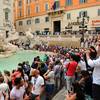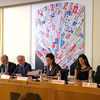Elections: Earth Tremors in Milan
ROME – Last week the doom sayers predicted that an earthquake would flatten Rome. They got it wrong. The earth did shake, but the seismic shocks took place Sunday and Monday in Milan, where voters took a slam at Premier Silvio Berlusconi and the center-right candidate he was touting for mayor, Letizia Moratti. The race was not even close; with a scant 41.6% of the final count vote—a 10% decline from her victory in Milan city elections just five years ago—Moratti lost by over six points to her adversary, the left-leaning Giuliano Pisapia. Although neither candidate received the minimum of 50.1%, Pisapia, with 48%, seems in place to win in the run-off slated for May 29. A novelty: Pisapia was not identified with the Partito Democratico (PD), but in the primaries, thanks to support from Nichi Vendola’s Sinistra Ecologia Libertà (SEL), won over a PD candidate.
The balloting took place on Sunday and Monday in big cities and small towns scattered throughout all of Italy, including Sardinia, but the Milanese vote was declared beforehand to be a bellwether of national feeling by, first of all, Berlusconi himself. In the once-upon-a-time Communist party organ L’Unità, editorial cartoonist Sergio Staino synthesized the situation by showing a pained Berlusconi struck in the head by a metallic souvenir model of the Duomo cathedral of Milan, and saying, “This time it really hurts.” (In mid-December 2009 a deranged man literally struck Berlusconi in the face with a souvenir model of the Duomo.) And it must indeed hurt: Milan was the birthplace of Berlusconi’s personal financial clout—the heart of his real estate, banking and media holdings.
In Milan itself not only are politics at stake, but, because Milan is the capital of wealthy, productive Northern Italy, it means a lesser degree of control over publicly-owned banks and business enterprises. Not least, in 2015 Milan is hosting the Universal Exposition, which will occupy a 272-acre site and pavilions from some 120 countries.
Throughout the past two years of corruption allegations and sex scandals Berlusconi has defended himself by saying that however the media defamed him, he remained popular with ordinary people, a claim regularly bolstered by his pollsters of preference. The Milan results—and he had only half the personal preferences of 2006—make this claim more difficult. As one pundit asked, marveling, “Is the Berlusconi myth still true; is he still invincible? Or is this the tipping point, and he’ll be put out to pasture in three months time?”
That prediction may be premature, but no one in the Berlusconi camp is pretending that the Milan elections do not matter, and recriminations are pouring in from the disgruntled in Berlusconi’s own Partito della Libertà (PdL). Berlusconi himself is said to blame his coalition partner Umberto Bossi of the Northern League for showing governmental inconsistency by opposing Berlusconi’s support of the NATO bombing of Libya. He is also said to be blaming Moratti for having maliciously (and erroneously) accusing Pisapio of being a car thief and terrorist hanger-on, charges made during the last seconds of a TV debate, when she knew Pisapia was left without time to respond.
Meanwhile, Berlusconi’s chief ally, the Northern League, blames Moratti for speaking in such extremist slogans unfamiliar to this normally level-headed moderate, but cooked up (presumably) by Berlusconi’s PR gurus. Curiously, some in Milan appeared worn by the former moderate Berlusconi’s talk and tactics, which came off as extremist in comparison with the League, which unexpectedly began to sound more moderate than the PdL. And within the PdL there is also a burgeoning quarrel about whether or not it was wise to break with Gianfranco Fini, president of the Chamber of Deputies and former coalition ally.
Bossi’s people have reason to seek a scapegoat, for his party unexpectedly slumped from its 14% in regional elections held just one year ago to 9.5%.
The result is that some here are already predicting the collapse of the Berlusconi government, possibly on June 19, when the League is scheduled to hold a convention in the heart of the Padania. Bossi, however, has no need to wait, and may choose before that time to withdraw his party’s support from the two-party ruling coalition (Northern League and Berlusconi’s PdL) unless his party’s candidate for premier, Minister of Economy and Finance Giulio Tremonti, takes Berlusconi’s place. Tremonti is a professor of law at Pavia University and is credited with so far keeping the Italian economy out of the Southern European tier of financially feeble countries (Spain, Greece, Portugal).
The Milan elections overshadowed the others, but they too were important, beginning with Naples, where leftist alliances have governed for l8 years. The result there is a shift to the right, with Gianni Lettieri of the PdL winning 38.5%--enough to sink the Partito Democratico candidate, but not enough to avoid a run-off with the surprisingly successful candidate of Italia dei Valori, former magistrate Luigi De Magistris, with 27.5% of the vote. In a slap in the face, the PD candidate won barely 19%. On the other hand center-left candidate Piero Fassino won hands down in Turin with 56.7% of the vote. There the center-right candidate Michele Coppola made a remarkably feeble showing of only 27.3% Another surprise came in Bologna, the traditionally leftist city where Beppe Grillo won 10% (and 5% in Turin, by the way).









































i-Italy
Facebook
Google+
This work may not be reproduced, in whole or in part, without prior written permission.
Questo lavoro non può essere riprodotto, in tutto o in parte, senza permesso scritto.